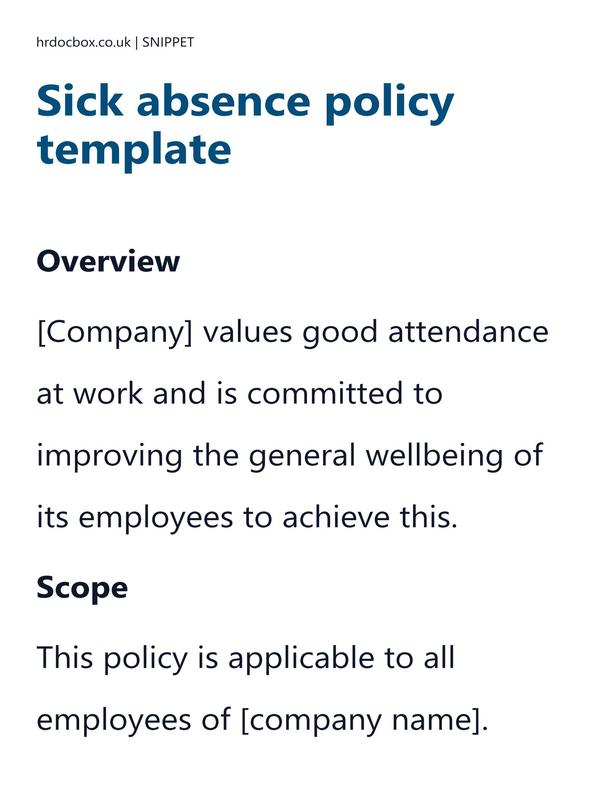Sick absence policy template


Our Sick Absence Policy Template facilitates effective sick leave management, supports employees' health, and minimises disruptions in the workplace.
- Includes Sick absence policy template, plus 12 months’ access with all updates provided free of charge and notified to you.
- UK-specific accuracy.
- 942 words over 3 pages.
- Last updated 16/09/2025.
- Format: Word / plain text / email.
- Delivery: Instant download after purchase (no physical item).
- Access: Download link shown here after checkout.
- This Sick absence policy template will SAVE you up to 2 hours drafting & research. Save cost. Reduce risk.
Sick absence policy
1 Overview
1.1 [Company] values good attendance at work and is committed to improving the general wellbeing of its employees to achieve this.
2 Scope
2.1 This policy is applicable to all employees of [company name].
3 General principles
3.1 Notification of Absence
3.1.1 Although we aim to secure regular attendance, we do not expect employees to attend when they are unwell.
3.1.2 Should you be unable to attend work due to illness or injury, you must comply with the following sickness absence reporting procedure:
3.1.3 On the first morning of your sickness absence, you must contact the Company and speak to your line manager at the earliest possible opportunity and as close to your normal start time as possible. In any event, this must be no later than two hours after your normal start time. If you are unable to speak to your line manager personally, you should speak to [insert name of contact]. You should give details of the nature of your illness and, if the illness is of a minor nature, you should indicate when you believe you will be fit to return to work. You must inform your line manager as soon as possible of any change in the date of your anticipated return to work.
3.1.4 For an absence of seven consecutive calendar days or less, you are required to telephone your line manager on a daily basis in accordance with the reporting procedure set out above. You must also complete a self-certification of sickness absence form immediately on your return to work. Self-certification forms are available from (and should be returned once completed to) [insert name of contact]. You are reminded that it is a serious disciplinary offence to provide false information on a self-certification form.
Should your sickness absence
This is a 30% preview of the Sick absence policy template. For instant full access, purchase this item or a parent bundle.
Sick absence policy template purpose
A sick absence policy is commonly referred to as a "sickness absence policy" or a "sickness absence management policy". The policy outlines how an employer will manage employee absences due to illness, including the procedures for reporting sickness, how much sick pay employees are entitled to, and any documentation required to support an absence.
The purpose of a sickness absence policy is to provide clear guidance to both employees and employers on how to handle sick leave, and to ensure that employees are treated fairly and consistently when they are unable to work due to illness. It also helps employers to manage staffing levels and plan for any necessary cover or arrangements during an employee's absence.
Practical application of a Sick absence policy template
- Issue the Sick absence policy template during onboarding / after changes / planned refresher.
- Send it to appropriate internal recipients such as employees, workers, contractors etc. and request confirmation that is has been read and understood.
Compliance
Compliance
This Sick absence policy template incorporates relevant UK laws and HR standards, including those listed below:
-
Employment Rights Act 1996: Sets out statutory rights for sick pay and leave entitlements for eligible employees.
-
Statutory Sick Pay (SSP) Regulations 1982: Outlines the rules for paying SSP to employees who are unable to work due to illness.
-
Equality Act 2010: Requires employers to make reasonable adjustments for employees with disabilities related to sickness absence.
-
Health and Safety at Work etc. Act 1974: Places a duty on employers to ensure the health, safety, and welfare of employees, which can impact sickness prevention.
-
Working Time Regulations 1998: Includes provisions for working hours, rest breaks, and rest periods, affecting employees' well-being and sickness rates.
-
Fit for Work Guidance: Provides guidance on managing sickness absence and promoting employee health and well-being.
-
Employment Contracts: Individual employment contracts may include specific terms related to sick pay, reporting procedures, and absence notification.
Frequently Asked Questions about a Sick absence policy template
Frequently Asked Questions about a Sick absence policy template
-
Can I use the Sick absence policy template in my small business?
Yes. The Sick absence policy template is designed to be flexible and suitable for organisations of all sizes, including small businesses and charities. It follows UK employment law best practice, so even if you don't have an in-house HR team, you can confidently apply it.
-
Is the Sick absence policy template compliant with 2026 UK employment law?
Absolutely. Like the Sick absence policy template, all of our templates are drafted with the latest ACAS guidance and UK employment legislation in mind. We review and update them regularly, so you can be confident they remain compliant.
-
Can I customise the Sick absence policy template for my organisation?
Yes, we highlight the areas of the Sick absence policy template that you need to update with your own details, and where you need to make decisions to suit your situation. This saves you time and ensures that you meet best practice.
-
Do I get instant access to the Sick absence policy template?
Yes. Once purchased, you'll be able to download the Sick absence policy template instantly. Templates are provided in editable Word or Excel format so you can customise them easily, and in PDF format for easy sharing.
-
What if I need more help, not just a Sick absence policy template?
If you're looking for broader support, we also offer toolkits and library bundles that include the Sick absence policy template, along with other HR templates and policies for fully managing your situation. These may be more cost-effective if you need deeper advice.
-
Why should I use this Sick absence policy template, and not AI to generate it?
The risk of using a free AI-generated template 'without review' includes your legal exposure, missing context, and no awareness of the wider process, whereas purchasing the Sick absence policy template from us mitigates that risk.
